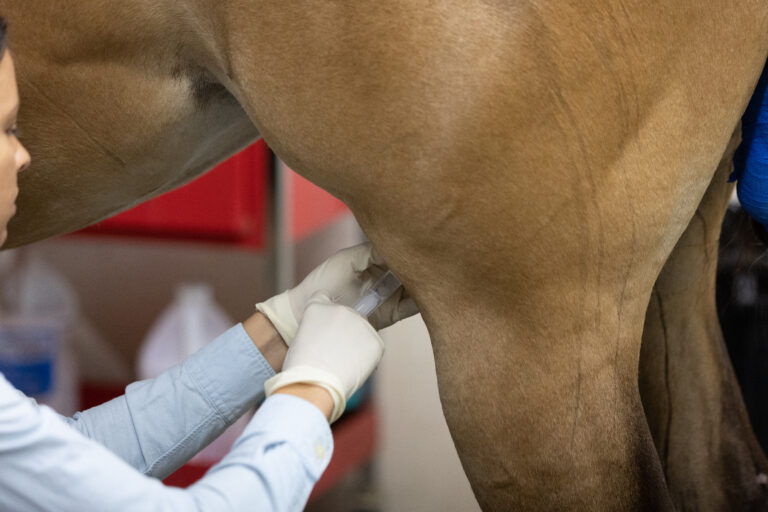
At the 2022 AAEP Convention, Miranda Gosselin, DVM, presented “Building a Team-Based Culture.” She noted that veterinary practices that invest in such a culture can minimize employee turnover, create a more harmonious workplace environment, and improve profitability.
She began her presentation by sharing some general workforce statistics to highlight the importance of this issue. In 2021, more than 48 million people quit their jobs. According to the Bureau of Labor, 4.2 million quit in August 2022 alone.
The average cost of hiring is estimated at $4,700 per new employee, she said, or 50-150% of salary, depending on the source. Those costs include recruiting, training, revenue decline, onboarding, development, loss of clients and burnout of remaining team members, she said.
Retention is Crucial
Because the costs of losing staff—especially veterinarians—is so high, retention is crucial in an equine veterinary business.
“The revolving door model is broken,” Gosselin said. No longer are veterinarians easily replaced. “Retention is part of a successful recruitment plan,” she stated.
Retention is often based on culture, she noted. Culture is defined as “the set of shared attitudes, values, goals, and practices that characterize an institution or organization.”
She said when thinking about culture, “Think about the bus that the team is on, and what seats each of the team is sitting in. Culture is the bus.”
She then relayed a story about sitting on uncomfortable buses with bad seats or near the bathroom. With that example, she brought home the idea of what a bad culture can feel like: “People want to get off the bus.”
Changing Your Veterinary Practice’s Culture
The speaker then shared the good news that you can change your practice’s culture. She described the old culture of her practice, where toxicity, hazing, poor communication, resistance to change, and a legacy of throwing new hires “into the deep end” had prevailed.
Instead, she said, a positive culture is team-based, where everyone has value, purpose and a voice. There is respect, gratitude, honesty and transparency. All of those lead to increased trust, she added. To build this culture, it must follow the practice’s mission, vision and core values. Without this direction to follow, the individuals cannot work together as a team.
A healthy culture follows healthy leadership, Gosselin noted. Therefore, creating trust within the partner group must come first. Practicing active listening, leading by example, taking responsibility for failures, and sharing successes are all ways to lead with empathy.
If toxicity is the default, it is often because of damaged relationships between partners or the way an individual partner views employees. Culture comes from the top, she emphasized.
To build a healthy culture, the right people need to be on the bus, she continued. Practice owners need to fire toxic people and hire new employees that share the practice’s values and fit the culture. However, she said, “Don’t hire clones, because diversity is good.” After a trial period, if the new hire is not a good fit, let them go without delay, she advised.
Exemplary communication is essential to build a great team-based veterinary culture, Gosselin stated. It requires meetings of leadership, staff and doctors, because without clarity, organizations cannot grow and thrive.
At her practice, they used Insight Technology to perform personality tests to understand each individual’s needs and preferences. To streamline communication, they utilize Slack with different channels. The speaker emphasized that proactive communication is not micromanagement.
Collecting Employee Feedback
Another important aspect of creating a strong team is feedback, she said. Utilizing candid engagement surveys, 360-degree reviews and exit interviews can provide a wealth of information that you can then use for improvement. Asking team members how they prefer to receive feedback is a critical step, as is communicating with respect and empathy.
This is also true for compensation, she added. Some veterinarians prefer salary rather than production. Others prefer the opportunity to earn compensation commensurate with their production.
Take-Home Message About Veterinary Culture
In closing, Gosselin said that supported employees have increased engagement. That leads to more loyal clients, which further leads to increased profitability. If practice owners actively create a more pleasant and inclusive business culture, they will more readily attract and retain veterinarians and staff members, leading to higher success.
Disclaimer from sponsor: This content is subject to change without notice and offered for informational use only. You are urged to consult with your individual business, financial, legal, tax and/or other medical providers with respect to any information presented. Synchrony and any of its affiliates, including CareCredit, (collectively, “Synchrony”) makes no representations or warranties regarding this content and accept no liability for any loss or harm arising from the use of the information provided. All statements and opinions in the article are the sole opinions of the author. Your receipt of this material constitutes your acceptance of these terms and conditions.

![[Aggregator] Downloaded image for imported item #18808](https://s3.amazonaws.com/wp-s3-equimanagement.com/wp-content/uploads/2025/11/06141153/EDCC-Unbranded-17-scaled-1-768x512.jpg)


